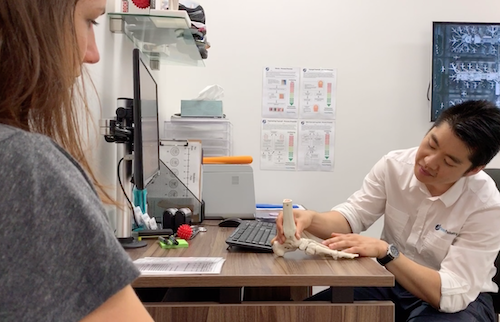Heel Pain
Is heel pain making your life a misery?
Are you limping out of bed every morning, and feeling a lot older than you should?!
Do you get a pain in the heel that gets worse through the day, making it hard to walk or stand at work or home?
Have you had to stop playing sport or exercise because of pain in your heel area?
Have you had to take time off work due to heel pain?
Does your child limp and complain of heel pain, worse after sports or lots of walking?
If you answered yes to any of the questions above, you would benefit from our 3 Step Podiatry Heel Pain Assessment.
Step 1 - What is wrong? We use our expertise in exclusively treating foot conditions and our world class diagnostic equipment and imaging to get the right diagnosis for the cause of your heel pain. We’re off to a good start already!
Step 2 - Why has it happened? We dive deep to uncover the actual cause of your injury, not just try and cover up the symptoms, and we use video gait and other tool to explain this to you so you fully understand it. Now you’ll really understand why this has happened, and why other treatments haven’t helped so far!
Step 3 - How can we fix it? We provide you with a tailored Proven Process Treatment Plan, which outlines exactly how we can fix your heel pain, and keep you free from future foot pain. If you are ready, we can immediately start treatment to start your journey back to normal life, free from heel pain.
At Pioneer Podiatry, we have seen over 14,000 feet fixed, and have been successfully treating all the causes of heel pain, including plantar fasciitis, Achilles tendonitis, heel spurs & sever's disease (children's heel pain) for over 15 years.
Plantar Fasciitis is the most common cause of heel pain and also the most common condition presenting to our clinic. Every day we see between five and ten cases of this condition. That being said, it is a very complex condition that needs to be correctly diagnosed and treated specific to each person.
The Plantar Fascia is a thick fibrous band of tissue in the bottom of the foot which runs from the heel to the base of the toes. When placed under increased stress, the Plantar Fascia can stretch and tear, resulting in degeneration of this tissue, particularly at its insertion into the heel bone.
In some cases, the pain is also felt in the arch. The tears can become degenerative scar tissue, which is less flexible than the fascia and hence aggravate the problem. Continuous straining of the fascia at the heel bone may eventually lead to the development of bony growth on the heel (heel spur).
In majority of cases of Plantar Fasciitis, the heel spur is NOT the cause of the pain. The pain is due to the degeneration and weakening of the soft tissue (Plantar Fascia), regardless of whether a heel spur is present or not.
Other less common causes of heel pain
Plantar fascial tear
Plantar fascial fibromatosis, also known as Ledderhose's disease
Plantar Calcaneal nerve entrapment syndrome
Insertional Achilles tendonopathy/ enthesopathy/ Haglunds deformity
The foot doctors at Pioneer Podiatry are trained foot specialists that can diagnose and treat all the above conditions.
What does it feel like to have plantar fasciitis caused heel pain?
Pain on the sole of the foot, often localised to the front of the heel
Pain that is usually worse the first few steps in the morning and after rest periods during the day
Pain often aggravated by prolonged standing, walking or running, especially on hard surfaces
Burning, numbness and throbbing around the heel when resting at night
Potential causes of plantar faciitis related heel pain:
Over-pronation (arch collapse)
Tight calf muscles and Achilles tendon
High arches and rigid feet
Barefoot on hard surfaces or incorrect or worn out shoes
Jobs that require lots of walking on hard surfaces
Over training or sudden increase in training
Weight gain
With our tools and expertise, we are able to assess and decide which of these factors are causing the injury.
Heel pain in children
Heel pain in children is usually cause by another condition called calcaneal apophysitis (severs disease), however it can be caused by various other conditions, some of them serious. It is important to come and have your child expertly examined by us to determine which condition is causing this pain, and to develop a treatment plan to fix it for good, and prevent long term injury and disability.
How to fix heel pain
At Pioneer Podiatry, we have all the necessary tools and treatments necessary to effectively treat heel pain in any patient, of any age, from any cause. Treatments for your pain may include:
Foot strapping to decrease the strain on the Plantar Fascia
Further calf, Achilles tendon and arch stretches
Foot strengthening exercises
Ice massage, arch massage, dry needling and other forms of physical therapies
Reducing your training load and intensity (try alternative exercises like swimming, cycling and upper body weights which have less impact on the feet)
Footwear changes (correct support and midsole cushioning, small heel height)
Customised Foot Supports (Orthotics) to reduce over-pronation and cushion the feet
Shockwave therapy to accelerate body’s self-healing
Moonboot to further immobilise foot and reduce strain on Plantar Fascia
In very few cases, surgical intervention is necessary
Even though heel pain is a very common condition it can be very complex in nature. It is very important to get a correct diagnosis and a treatment plan which will suit your individual situation. If you have tried various treatments, without much success, then it is time to give us a call and speak to the feet experts.








